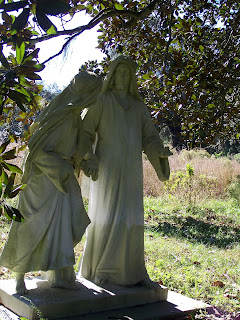I am visiting my mom and dad in Williamsburg, Virginia for a few days. For a few moments in December, I thought about a holiday visit, but it's much easier in January when we have fewer commitments. It's also cheaper.
They live in a retirement community that has multiple levels of care; they have an independent living unit. Yesterday I went with Mom and Dad's singing group to the Memory Care Unit, where most of the residents have some form of dementia, which I assume is permanent. It was somewhat distressing, although everything was orderly. I was probably more distressed than the residents. They tapped their fingers and nodded their heads and perhaps wondered why we were singing "Sleigh Ride" along with patriotic songs. Or perhaps they're not trying to make sense of the world anymore.
We sang lots of traditional songs, stuff I learned in elementary school, like "This Land Is Your Land." It made me wonder if kids are still learning these songs. What will they sing to us when they come visit?
I thought of the ways that songs stay with us, even when our brains have let go of so much other information. We sang "Sleigh Ride," and many of the Alzheimers residents mouthed the words. I have noticed this in church too.
I thought of that line from the Psalms: "How can we sing the Lord's song in a foreign land?" As I recall, that Psalm was written during the Babylonian captivity. But it has always spoken to me, since I have always felt myself to be in an exile of some sort.
Now I'm thinking about exile in a different way yet again. Being here at my parents' retirement community has given me an interesting change of perspective. It is sobering to realize how easy it is to tip into poor health, especially as we age.
But it is comforting to know that this process doesn't have to rip every comfort from us.
thinking too hard
5 years ago











































